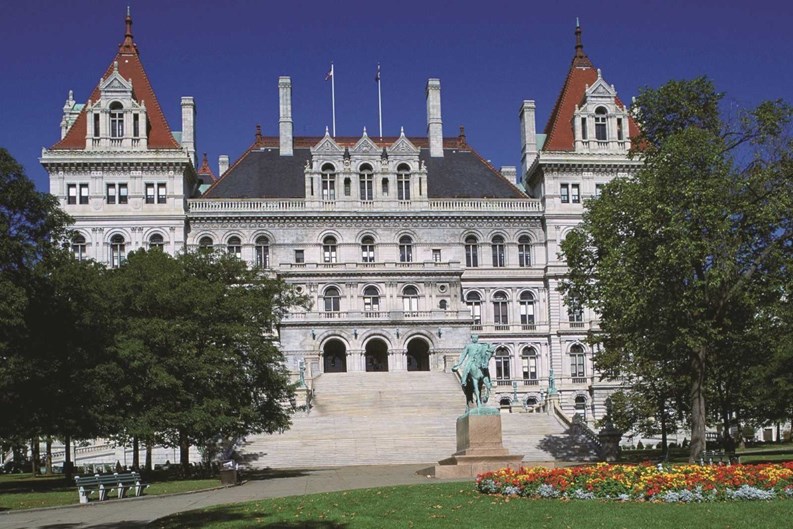Although the budget and tax cuts occupy the public agenda in these recessionary times, housing is still as big an issue as ever. Many housing-related bills, including those specifically related to co-ops and condos, have been introduced at both state and local levels. Some of these bills are new, but others have been reintroduced. Here's a look at some of the pending legislation working its way through the hallowed halls of governance in New York.
Up in Albany
Large numbers of housing-related bills are introduced in Albany every year. “There are presently over 200 bills in Albany right now that deal with real estate,” says Greg Carlson, the executive director of the Federation of New York Housing Cooperatives & Condominiums (FNYHC) and head of Carlson Realty in Forest Hills. “About 66 deal specifically with condominiums and cooperatives. Perhaps two or three [of those] may see the light of day.”
A search of the bills before the Assembly in early April revealed a cross section of bills, such as A02163, which would require boards to act on applications to purchase condos or co-ops within 45 days, with failure to do so resulting in automatic approval; A00797, which would create a special sub-part of the housing part within the civil court system to handle cases involving co-ops and condos; and A02195, which would “extend the requirements for property certification condition disclosure statements to sales of condominiums and cooperative apartments.”
For Carlson, the bill to watch in Albany is S00395, which would “create the Office of the Cooperative and Condominium Ombudsman, authorize the residential unit tax, and establish the Office of the Cooperative and Condominium Ombudsman Fund.” The office would educate co-op and condo owners about their rights and responsibilities, mediate problems, conduct hearings and monitor elections.
Some people in the co-op and condo community welcome such a bill, believing it would be recourse from abusive boards; but others fear that it would just create another layer of state bureaucracy. There are already offices of condo/co-op ombudsmen in several states.
Mike Slattery, senior vice president of the Real Estate Board of New York (REBNY) says the issues in Albany that most concern him are the J-51 and 421-a tax abatements (for capital improvements in existing buildings and for new construction, respectively) and the rent stabilization laws.
REBNY’s website (www.rebny.com) says the organization advocates an extension to 421a with amendments including an optional long-term affordability provision for 80/20 projects, extension of the construction-period completion and benefit for 36 months, a conversion provision and more. The organization also wants an extension of the J-51 program because it “provides vital economic assistance for existing residential properties.”
A bill has been introduced in the state Senate (S4283) that was prompted by the volatile situation in eastern Queens that saw assessed valuations of some developments jump by double digits and in some cases by triple digits. This bill, introduced by Sen. Toby Ann Stavisky, would reclassify co-ops and condos, currently listed for assessment purposes as “Class 2” along with rental properties, within “Class 1,” together with one- and two-family homes. Tax assessments on Class 1 properties are capped at 6 percent of estimated market value.
Many of the co-op and condo-related bills that have been introduced in the Assembly have the same sponsor or co-sponsor—Jeffrey Dinowitz (D-Kingsbridge/Riverdale). Dinowitz isn’t on the Housing Committee, but his district, particularly Riverdale, has many co-ops. One of the bills he’s sponsored, he says, tries to deal with the sponsors who co-op an existing rental building, but then make no effort to sell the apartment. “Some of them have co-oped apartments for the sole purpose of getting apartments out of rent stabilization,” he says.
Another bill that Dinowitz has consistently advocated would ensure that once a rental building is converted to a co-op, the sponsor cannot be a director or be on the board. “Often, even years later,” he says, “the landlord is now the sponsor, and he really controls the building. Our bill would ensure that control of the converted co-op be turned over to unit owners as soon as possible.”
Since most of the proposed laws about co-ops and condos would primarily affect New York City and its immediate suburbs (although condos are becoming more popular throughout the state), how do legislators from Upstate or Western New York make decisions on these proposals?
According to lawmakers, they usually seek out and accept the opinions of downstate legislators with whom they are friendly and whom they respect. In return, they might seek out the advice of upstate colleagues on a farm bill. That’s the way legislatures work.
In the City Council
A search of the New York City City Council’s website reveals that bill after bill comes up under the subject “housing,” but none of the current bills contain the words “condominium,” “co-op,” “cooperative” or “condo.”
The main building-related bills that the City Council has focused on in the recent past seem to be the five “green bills” based on recommendation by the Green Codes Task Force. These bills were enacted into law ate last year. Kim Thai, City Council press officer, provided us with some of the basics.
Intro 267-a explicitly recognizes environmental concerns as a “guiding principle” of building, mechanical and other codes.
Intro 262-a allows exits and corridors to be lit by lighting sensors or photosensors providing that a minimum level of lighting is maintained.
Intro 266-a requires that “certain commercial spaces” install lighting sensors and controls, including one that must be turned on manually but turns itself off automatically.
Inro 273-a amends the Building Code to replace watts with foot-candles as a means of measuring light within temporary walkways, foot bridges and sidewalk sheds.
Intro 277-a allows the use of sensors in laundry rooms “if safety conditions are met.”
“Now, under the energy code,” says Carlson, “any system that is being touched must be looked at from an energy conservation point of view. This adds to the cost of designing a repair or project—the material is more costly so the overall repair and project is much higher. The benchmarking has sprung up a new cottage industry, with fees anywhere from $300 to $1,500 per building. So the benchmarking firm is now your new energy auditor and retro commissioning agent—more costs.”
FNYHC, Carlson adds, also had been following Intro 188, filed last year, a version of the “written rejection” bill. This bill would have obligated co-op boards to inform applicants within 45 days whether their applications have been accepted. If the applicant is rejected, they would have had to give the applicant a written “certification of non-discrimination” which would state that decision to disapprove was reached without regard to race, national origin, age, marital status or any one of about 10 different factors.
There was no action on the bill last year, and, as Thai notes, any bill that did not pass has to be reintroduced if it is to be heard again. As of press time, it had not been introduced for 2011. In the past, many people in the co-op and condo community opposed the idea, believing it would take away boards’ autonomy and discourage residents from serving on boards.
Ralph Perfetto, head of the Brooklyn Co-op and Condo Coalition, believes that Albany, not City Hall, is where the action is for bills that would impact co-op and condo owners and board members in major ways.
Impact of Federal Programs
Changes in the Fannie Mae and Freddie Mac financing programs have greatly affected the real estate industry. Fannie Mae, founded by the government in the late 1930s, basically provided banks with federal money to finance more home mortgages. In the 1990s, the corporation, under federal legislation, began to focus more and more on affordable housing for middle- and low-income homebuyers.
As for Freddie Mac, it was created in 1970. It buys mortgages on the secondary market, pools them, and sells them as a mortgage-backed security to investors. This theoretically increases the supply of money available for mortgage lending and for new home purchases.
Shares in Fannie Mae and Freddie Mac plummeted in 2008, and later that year the two semi-autonomous entities were placed under the “conservatorship” of the Federal Housing Finance Agency (FHFA). As this article was being written, legislation was being introduced in Congress to dismantle Fannie and Freddie or spin them off as completely private entities.
Carlson says that “This is the biggest problem facing the industry right now—the lack to funding for cooperatives and condominiums. The banks’ lack of funds to support share loans and mortgages have made the turnover of units at a standstill. Many lenders are shying away from cooperative and condominium loans if they are selling to the secondary market … with the federal government floating plans to eventually close down Fannie Mae and Freddie Mac, this also leads to the uneasiness in the loan market.”
Slattery of REBNY says, “Freddie Mac and Fannie Mae provided a certain liquidity to the mortgage market—they made mortgages more affordable and banks more willing to make loans. Continuing these services is critical, whether they are maintained in the same structure in the past or in another one. Liquidity and availability of affordable mortgages are important.”
What about the federal stimulus program? It contained a homebuyers’ tax credit—an $8,000 tax credit for first-time homebuyers’ and a $6,500 tax credit for repeat homebuyers. According to the IRS, the credit expired in late 2010.
The credit, says Slattery, was “very beneficial to New York and the rest of the country. It helped promote sales activity. Many of the prices in Manhattan were well above the threshold for eligibility, but there were pockets in Manhattan that were below the threshold, and certainly places in the Bronx, Brooklyn and Queens.”
One federal action that would have negatively impacted the city’s co-op and condo community was a proposal by FHFA to prohibit Fannie Mae, Freddie Mac and the Federal Home Loan Banks from making loans to buyers of properties that have a transfer fee, or flip tax. These fees are not truly taxes, but are imposed on buyers or sellers as a way to raise money for the co-op without raising maintenance fees or instituting across-the-board fees.
The feds’ rule was prompted by non-related practices in another part of the country. Eventually, because of pressure from local officials and organizations, New York co-ops and condos were exempted from the rule in February. “I think it was absurd to suggest that co-ops can’t charge a flip tax,” Dinowitz commented.
Input From Professional Organizations
How do organizations like the Council of New York Cooperatives & Condominiums (CNYC), REBNY, FNYHC and others make their wishes known to legislators?
Often, the organizations use their knowledge of real estate and building to explain things to legislators. A legislator might have a very broad idea of what he wants the bill to accomplish and may be unaware of unexpected costs or problems that the bill might cause. At times, after representatives meet with a legislator and explain their concerns, that legislator might modify his or her bill.
Local co-op and condo-related groups are also important. For example, Dinowitz often meets regularly with the Association of Riverdale Cooperatives and Condominiums. We’ve mentioned the Brooklyn Co-op and Condo Coalition. And in northeast Queens, the Presidents Co-op Council was the force behind the proposal to reclassify co-ops and condos for assessment purposes.
“One thing we try to do,” said Perfetto, speaking for the Brooklyn group, “is to meet with other neighborhood groups throughout the city. In Queens, we do it through the Borough President’s Office.” After several groups agree on a common agenda, he says, they contact state legislators.
Whenever legislators convene, someone’s looking out to see whether what they’re doing is in the best interests of co-op and condo owners.
Raanan Geberer is a freelance reporter and editor living in New York City.







Comments
Leave a Comment